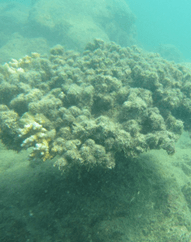Reef hits cause concern
 Back-to-back cyclones have raised alarm about potential damage to parts of the Great Barrier Reef.
Back-to-back cyclones have raised alarm about potential damage to parts of the Great Barrier Reef.
Pummelling by Cyclone Jasper in December, followed by Cyclone Kirrily, has led to significant concerns over the introduction of sediment-laden freshwater into the Reef.
The development comes just days before the Australian federal government’s February 1 deadline to report its reef protection commitments to UNESCO.
The Great Barrier Reef has been under threat of mass coral bleaching exacerbated by an El Niño weather pattern, but the immediate threat appears to have shifted towards the damage caused by flood plumes and heavy waves resulting from the recent cyclones.
Such conditions can lead to coral bleaching and hinder the growth of corals and seagrass meadows by blocking light and promoting algae growth.
Despite the cooling effect usually associated with cyclones, the Great Barrier Reef Marine Park Authority (GBRMPA) has reported sea surface temperatures remaining at least 1°C above average across the reef.
“We’re quite concerned about the potential impacts from the run-off on the reefs in the northern areas,” says Dr Jane Waterhouse from James Cook University's TropWater research group. She further noted observations of freshwater bleaching this summer.
Scientists have pointed out the unfortunate timing of Cyclone Jasper, coinciding with the end of the sugar cane crushing season, potentially increasing nutrient flow into the reef. They also say the challenge of monitoring and understanding the full impact of such events is compounded by a research gap in flood monitoring, primarily focused on inshore reefs.
The implications of climate change suggest a new pattern of stress for the reef, with intense rainfall events interspersed with periods of bleaching, offering little recovery time for the coral.
Dr Roger Beeden, GBRMPA's chief scientist, however, has offered a cautiously optimistic view, indicating that early reports suggested the impact of Cyclone Jasper might not be as severe as initially feared, though the full extent of the summer's pressures remains to be seen.
Amid these environmental challenges, the federal government is set to report to UNESCO on its conservation efforts, commitments to improve water quality, and measures to align climate targets with global heating limits.
Richard Leck from WWF Australia says there is a need for increased efforts in managing catchments and addressing legal tree clearing, which remains a significant concern for reef health.








 Print
Print